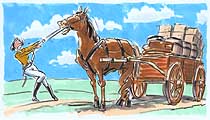 Sporadic occurrences may be
traced back to localized muscle strain. As such, it is a very common occurrence,
especially if the horse is not properly warmed up prior to exertion, if there is
an issue of lameness, or if the horse is over-exercised. This muscle strain can
be traced via a blood test checking for creatine kinase which enters the
bloodstream once muscles incur some damage. If you find that your horse is
suffering from a sporadic occurrence of tying-up, you will want to rest it in a
stall with plenty of fresh water available to it. Depending on the severity of
the symptoms, your horse may or may not require pain relievers. You will want to
contact your vet to make that determination. Sporadic occurrences may be
traced back to localized muscle strain. As such, it is a very common occurrence,
especially if the horse is not properly warmed up prior to exertion, if there is
an issue of lameness, or if the horse is over-exercised. This muscle strain can
be traced via a blood test checking for creatine kinase which enters the
bloodstream once muscles incur some damage. If you find that your horse is
suffering from a sporadic occurrence of tying-up, you will want to rest it in a
stall with plenty of fresh water available to it. Depending on the severity of
the symptoms, your horse may or may not require pain relievers. You will want to
contact your vet to make that determination.
For those horses suffering from chronic tying-up, you will want to consider a
change in diet. This should include a high quality hay feed as well as a mineral
and vitamin supplement. Additionally, if the muscles have been obviously damaged
by a bout of over-exercising, your will want to give those animals a longer rest
period – usually a couple of months – and then gradually resume the training. At
that point you may also increase the amount of grain you feed. Once the horse is
back to its pre-injury performance level, consider feeds with high levels of fat
since they are more energy-dense.
Should you own a horse that is affected by chronic tying-up, make sure to get
this diagnosis via a blood test which checks – among other things – the serum
chemistry as well as the vitamin E concentration, and also via a urine test that
measures the electrolytes. In extreme cases, muscle biopsies may be required.
The latter have indicated that there are at least two kinds of tying-up:
Polysaccharide Storage Myopathy is found in warm bloods, draft breeds, and also
breeds associated with quarter horses and the more serious Equine Polysaccharide
Storage Myopathy which is found usually in draft breeds only.
To counteract this condition, horses will benefit from daily rations of rice
bran as well as grass hay, since both have been indicated as reducing blood
glucose as well as insulin and muscle glycogen. In addition to the foregoing,
high fat feeds or supplementation with vegetable oil – in part to reduce
excitability - may also be required. To prevent further episodes of typing-up,
exercise should be resumed gradually once blood serum levels are once again
within the normal range; within 24 hours of a bout with tying up, a daily
turnout in a paddock is actually recommended.
 |